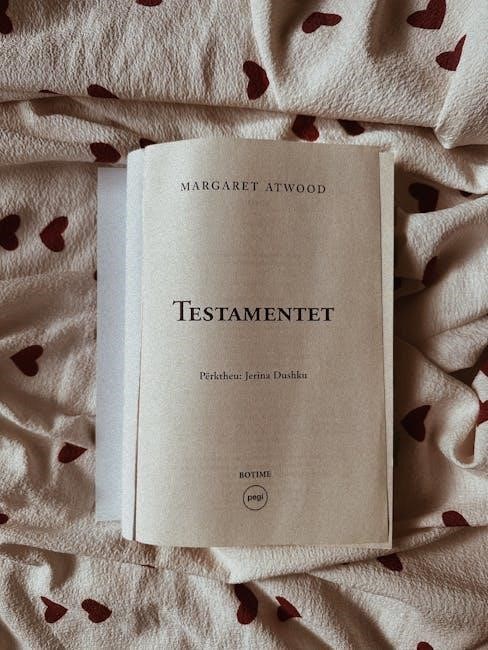rebecca daphne du maurier book pdf
Rebecca by Daphne du Maurier is a masterful gothic novel blending psychological suspense with a haunting exploration of jealousy, identity, and societal expectations.
Publication and Historical Context
Publication and Historical Context
Rebecca, written by Daphne du Maurier, was first published in 1938, marking a significant moment in gothic literature. Set against the backdrop of the 1930s, the novel captures the tension and societal shifts of its time. The story’s eerie atmosphere and psychological depth reflect the era’s pre-war anxieties. Translated into multiple languages, including Russian by G. A. Ostroy, it remains widely accessible. Published by various presses, such as Azбука, the novel’s enduring popularity highlights its timeless appeal as a gothic romance and psychological thriller.
The Significance of the Book in Gothic Literature
The Significance of the Book in Gothic Literature
Rebecca stands as a cornerstone of gothic literature, masterfully blending psychological suspense with romance and mystery. Its exploration of jealousy, grief, and identity resonates deeply, while its atmospheric setting, particularly Manderley, embodies the genre’s eerie and isolating traditions. The novel’s enduring influence is evident in its adaptation into films and its continued popularity, solidifying its place as a timeless classic in gothic fiction.

Plot Summary of “Rebecca”
A young protagonist marries the widowed Maxim de Winter and moves to his estate, Manderley, where she uncovers secrets about his late wife, Rebecca, and her mysterious fate.
The Mysterious Setting of Manderley
The Mysterious Setting of Manderley
Manderley, the grand estate in Rebecca, is a central character, exuding mystery and foreboding. Its labyrinthine halls, overgrown gardens, and decaying grandeur mirror the secrets within. The narrator’s recurring dream of returning to Manderley highlights its haunting presence. The estate’s isolation and oppressive atmosphere amplify the psychological tension, while its faded splendor reflects the lingering influence of Rebecca. Manderley becomes a symbol of both beauty and decay, shaping the characters’ fates and the novel’s dark, gothic tone.
The Enigmatic Character of Rebecca de Winter
The Enigmatic Character of Rebecca de Winter
Rebecca de Winter is an enigmatic figure whose presence permeates the novel, even after her death. Her mystique is upheld by the narrator’s obsession and the imposing atmosphere of Manderley. Rebecca’s charm, beauty, and dominance over the estate create a haunting legacy that shapes the story’s psychological tension. Her life and death remain shrouded in mystery, leaving the second Mrs. de Winter to grapple with her elusive image and the secrets surrounding her tragic fate.
Themes and Symbolism in “Rebecca”
Rebecca delves into themes of jealousy, grief, and societal pressures, with Manderley serving as a symbolic backdrop for the protagonist’s psychological journey and the haunting legacy of Rebecca.
The Exploration of Jealousy and Grief
Daphne du Maurier masterfully explores jealousy and grief through the unnamed protagonist’s struggles with Rebecca’s lingering presence. The novel portrays how jealousy fuels obsession, while grief manifests as an unrelenting shadow over Manderley. The protagonist’s internal turmoil mirrors the decay of the mansion, symbolizing the destructive power of unresolved emotions. This duality of themes creates a haunting narrative that delves into the psychological depths of love, loss, and identity, resonating deeply with readers.
The Role of Societal Pressures and Expectations
Societal pressures and expectations heavily shape the characters’ lives in Rebecca. The protagonist, a young woman, struggles to meet the ideals of her new role as Mrs. de Winter, while Rebecca’s legacy embodies the societal image of perfection. The class divide and gender roles amplify the tension, as the protagonist navigates a world governed by rigid norms. Manderley itself symbolizes the oppressive weight of societal expectations, trapping its inhabitants in a cycle of duty and conformity.

Main Characters in “Rebecca”
The novel revolves around the unnamed protagonist, Maxim de Winter, and the enigmatic Rebecca. Other key characters include Mrs. Danvers, the sinister housekeeper, and Frank Crawley.
The Second Mrs. de Winter: The Unnamed Protagonist
The Second Mrs. de Winter: The Unnamed Protagonist
The unnamed second Mrs. de Winter is a timid, young woman navigating a world of wealth and secrets. Her identity is overshadowed by Rebecca, her predecessor, as she struggles to find her place at Manderley. Her journey from innocence to self-discovery is central to the novel, with her voice guiding the reader through the psychological landscape of love, loss, and identity.
Maxim de Winter: A Man Haunted by His Past
Maxim de Winter: A Man Haunted by His Past
Maxim de Winter, a wealthy widower, is a man consumed by the shadow of his deceased wife, Rebecca. His marriage to a younger, unnamed woman is marked by emotional distance and unresolved grief. Haunted by memories of Rebecca, Maxim struggles with guilt and secrecy, revealing a complex character torn between his past and present. His enigmatic nature and protective stance toward Manderley further highlight his inner turmoil and the lingering influence of Rebecca in his life.
Rebecca de Winter: The Elusive and Enigmatic First Wife
Rebecca de Winter: The Elusive and Enigmatic First Wife
Rebecca de Winter is the enigmatic and charismatic first wife of Maxim de Winter, whose presence permeates the novel despite her death. Her beauty, charm, and mysterious past create an aura of fascination and dread. Through the narrator’s jealousy and Mrs. Danvers’ devotion, Rebecca’s larger-than-life persona is revealed. Her tragic demise and hidden truths about her life add layers to her character, making her a haunting and unforgettable figure in the story of Manderley.
Mrs. Danvers: The Sinister Housekeeper
Mrs. Danvers is the intimidating and enigmatic housekeeper of Manderley, whose eerie presence dominates the estate. Her unwavering loyalty to the late Rebecca de Winter and her disdain for the second Mrs. de Winter create a tense atmosphere. Mrs. Danvers’ manipulative nature and obsession with Rebecca’s memory heighten the psychological tension, making her a pivotal and foreboding figure in the novel’s dark, gothic narrative.

Historical and Cultural Context
Rebecca reflects the societal norms and anxieties of the 1930s, exploring themes of class, identity, and gender roles. The novel’s gothic atmosphere mirrors the era’s cultural tensions.
The Influence of the 1930s on the Novel’s Tone
The Influence of the 1930s on the Novel’s Tone
The 1930s setting of Rebecca deeply influenced its tone, reflecting the era’s cultural and social anxieties. Published in 1938, the novel captures the gothic and psychological suspense typical of the time, with its brooding atmosphere and exploration of societal pressures. The decade’s economic uncertainty and shifting gender roles are subtly woven into the narrative, creating a sense of tension and foreboding that resonates with the pre-WWII mood.
Real-Life Inspirations for the Story and Characters
Real-Life Inspirations for the Story and Characters
Daphne du Maurier drew inspiration from real-life locations and figures. Menabilly, a Cornish estate, became the iconic Manderley, influencing the novel’s atmospheric setting. The character of Rebecca was partially inspired by women of the 1930s, embodying elegance and rebellion. Du Maurier’s own experiences and observations of societal dynamics during this period also shaped the narrative, blending fiction with traces of reality to create a captivating and enduring tale.

Availability of “Rebecca” in PDF Format
Rebecca by Daphne du Maurier is widely available in PDF format, with legal and free sources offering downloads. Translated versions ensure global accessibility, preserving the novel’s timeless appeal.
Legal and Free Sources for Download
Legal and Free Sources for Download
Several legal platforms offer Rebecca in PDF for free, including public domain libraries and educational sites. Services like Project Gutenberg and ManyBooks provide authorized downloads, ensuring readers can access the novel ethically. Additionally, some academic institutions and online archives share PDF versions for study purposes, making it easily accessible while respecting copyright laws.
Translated Versions of the Book
Translated Versions of the Book
Rebecca is widely available in translated versions, including Russian by G. Ostrovskaya and Spanish adaptations. PDF versions of these translations can be found on platforms like Litres and educational websites. Additionally, adapted versions for language learners, such as the Macmillan Readers edition, are popular. These translations ensure the novel’s global reach, making it accessible to non-English speaking audiences while preserving its gothic essence and psychological depth.

Literary Analysis and Critical Reception
Rebecca is celebrated for its gothic romance and psychological depth, with critics praising du Maurier’s narrative technique. The novel’s exploration of jealousy and grief has endured, solidifying its literary acclaim and timeless appeal.
The Novel’s Style and Narrative Technique
The Novel’s Style and Narrative Technique
Daphne du Maurier crafts Rebecca with a masterful gothic style, employing atmospheric descriptions and psychological depth. The novel’s non-linear narrative begins with a haunting dream, setting a mysterious tone. Du Maurier’s use of an unnamed protagonist creates intimacy, while her vivid portrayal of Manderley as a living entity enhances suspense. The interplay of past and present, alongside subtle hints of Rebecca’s lingering presence, underscores the novel’s enduring literary appeal and critical acclaim for its narrative sophistication.
Critical Reviews and Academic Perspectives
Critical Reviews and Academic Perspectives
Rebecca has garnered widespread critical acclaim for its masterful gothic atmosphere and profound psychological insights. Scholars highlight its exploration of jealousy, identity, and gender roles, with the enigmatic Rebecca symbolizing both desire and destruction. The novel’s non-linear narrative and the unnamed protagonist’s voice have been praised for their innovative storytelling. Academic discussions often focus on the interplay of past and present, as well as the haunting symbolism of Manderley, cementing its status as a literary classic.

Cultural and Cinematic Adaptations
Rebecca has been immortalized in Alfred Hitchcock’s 1940 film, starring Laurence Olivier and Joan Fontaine, becoming a timeless classic in cinema and literature alike.
The 1940 Film Adaptation by Alfred Hitchcock
Alfred Hitchcock’s 1940 adaptation of Rebecca starring Laurence Olivier and Joan Fontaine remains a landmark in cinematic history. Faithfully capturing the novel’s eerie suspense, the film masterfully translates the gothic atmosphere of Manderley and the psychological tension between the characters. Hitchcock’s direction elevates the story, earning it widespread acclaim and solidifying its place as a classic. The film’s success further cemented the novel’s enduring popularity, introducing Daphne du Maurier’s work to a broader audience.
Other Adaptations and Interpretations
Beyond Hitchcock’s iconic adaptation, Rebecca has inspired numerous reinterpretations. A 2020 Netflix film starring Lily James and Armie Hammer offered a fresh visual take, while radio dramatizations and stage plays have kept the story alive. International adaptations, such as Indian and Turkish versions, highlight the novel’s universal appeal. These interpretations showcase the timeless allure of du Maurier’s tale, allowing new audiences to experience its gothic charm and psychological depth across diverse mediums and cultures.
Rebecca remains a timeless gothic masterpiece, captivating readers with its exploration of jealousy, identity, and love. Its enduring legacy ensures it continues to resonate across generations and cultures.
The Enduring Legacy of “Rebecca”
The Enduring Legacy of “Rebecca”
Daphne du Maurier’s Rebecca has left an indelible mark on literature and cinema. Its gothic themes and psychological depth continue to captivate audiences, inspiring numerous adaptations, including Alfred Hitchcock’s iconic 1940 film. The novel’s exploration of jealousy, identity, and societal pressures remains relevant, solidifying its place as a classic. Its influence extends beyond the page, shaping modern storytelling and ensuring its timeless appeal across generations.
Why the Book Remains Relevant Today
Why the Book Remains Relevant Today
Rebecca continues to captivate readers with its timeless exploration of jealousy, identity, and societal expectations. Its gothic atmosphere and psychological depth resonate with modern audiences, while its themes of love, loss, and self-discovery remain universally relatable. The novel’s enduring popularity is also fueled by its influence on literature and popular culture, ensuring its relevance in contemporary discussions of identity and relationships.
